Poetry
Poetry

I'm in the bath on all fours
‘I’m in the bath on all fours, toward blue water (my nose is bleeding), I’m an ephemeral bubble of time waiting to be popped’ is an experimental archive of exhibition and performance documentation, seminar transcripts and (visual) essays from Well Projects 2019 programme of the same name.
Across three phases, IITBOAF,TBW(MNIB),IAEBOTWTBP invited pairs of artists and academics to collaborate and expand on notions of the sub-aqueous, engaging with the nature of water, embodied experiences and the deep dark in relation to community and commonality.
Contributors:
Flora Parrott, Lindiwe Matshikiza, Harriet Hawkins, Lucy Mercer, Amy Pettifer & Jennifer Boyd (SHELL LIKE) Madeleine Stack, Leyla Pillai, Alex Borkowski, Hannah Rowan, Rachel Squire, Rikke Berg Jensen, Korallia Stergides & Raphael Schulenburg.
I’m in the bath... programme was curated by Kris Lock & George Harding with support from Flora Parrott
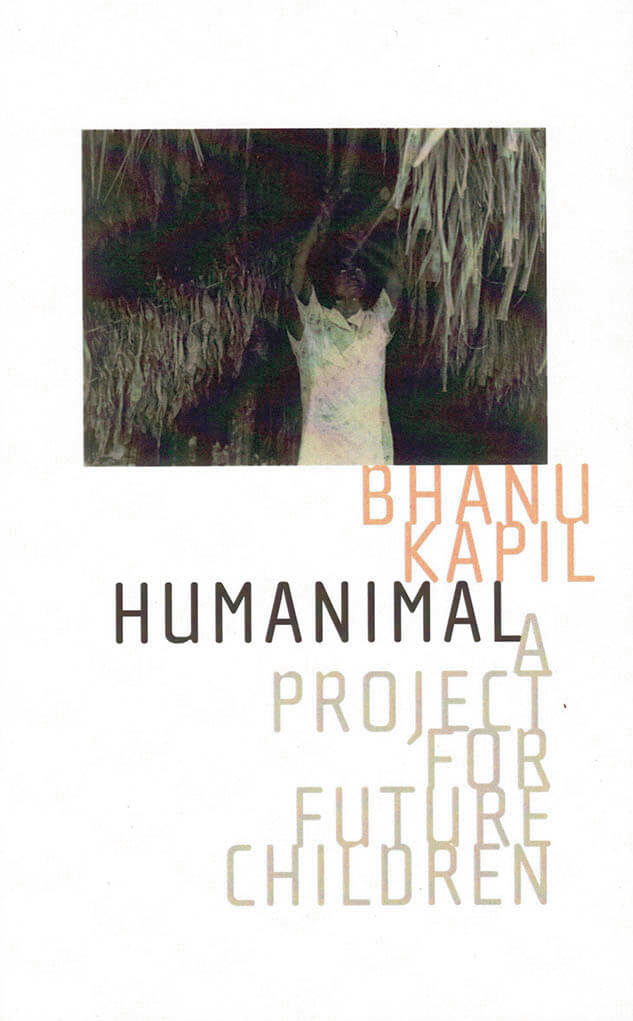
Humanimal: A Project For Future Children
In this prose document, Bhanu Kapil follows a film crew to the Bengal jungle to re-encounter the true account of two girls found living with wolves in 1921. Taking as its source text the diary of the missionary who strove to rehabilitate these orphans, through language instruction and forcible correction of supinated limbs, Humanimal functions as a healing mutation for three bodies and a companion poiesis for future physiologies.
Through wolfgirls Kamala and Amala, there is a grafting: what scars down into the feral opens out also into the fierce, into a remembrance of Kapil's father. The humanimal text becomes one in which personal and postcolonial histories cross a wilderness to form supported metabiology.
"Lucidly, holographically, your heart pulsed in the air next to your body; then my eyes clicked the photo into place. Future child, in the time you lived in, your arms always itched and flaked. To write this, the memoir of your body, I slip my arms into the sleeves of your shirt. I slip my arms into yours, to become four-limbed."
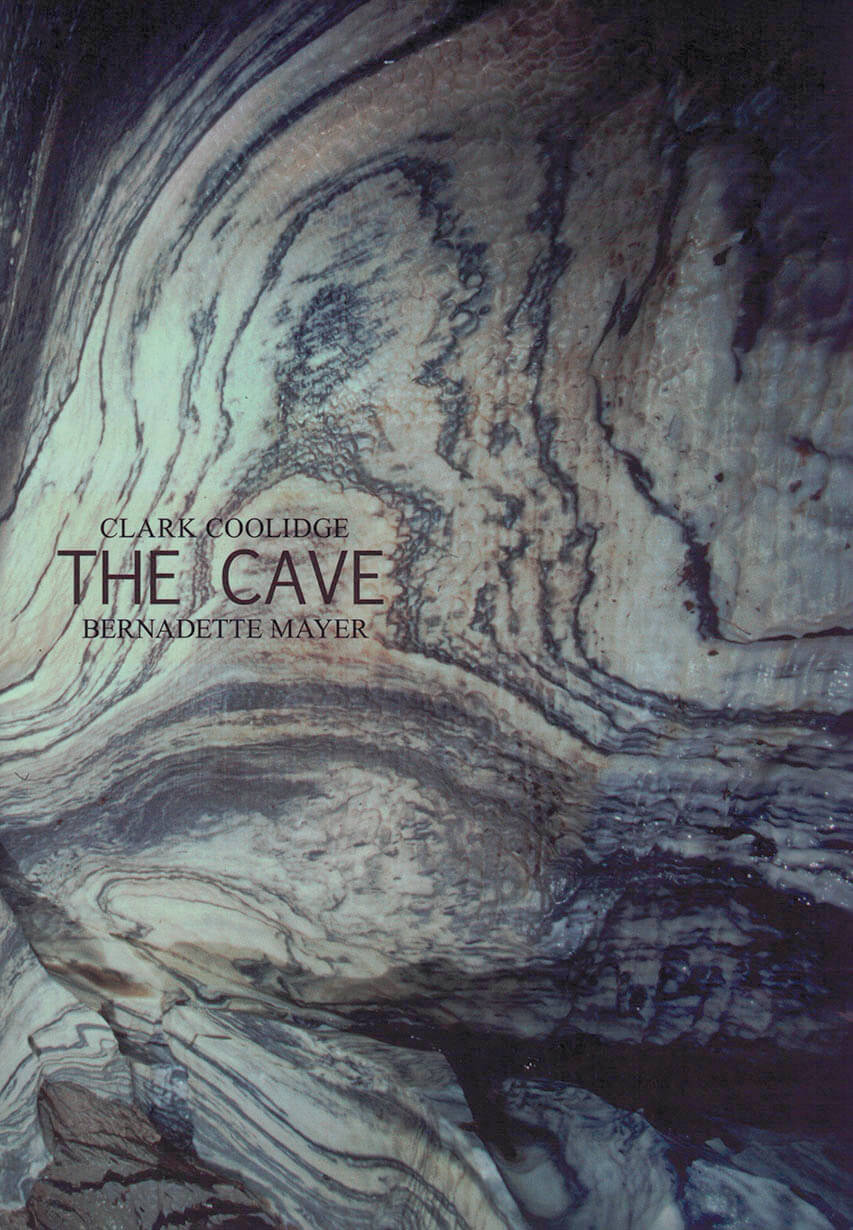
The Cave
Bernadette Mayer, Clark Coolidge
The Cave is a collaboration of prose, poetry, dialogue, and song alternately written by Clark Coolidge and Bernadette Mayer in their early thirties. Assembled between 1972 and 1978, The Cave explores the philosophy of Wittgenstein, the nature of language, and the connections between the present and past. It constantly challenges the reader to question reality, time, and the poets themselves. The work ranges from complex and imagistic rambles through imaginary landscapes to terse, clear accounts of exploring Eldon's Cave in western Massachusetts, the setting of several of Coolidge's poems. Like a mystery novel, The Cave draws the reader in with hints that all the strands weave together into a coherent picture.
Clark Coolidge and Bernadette Mayer have been writing for over fifty years, and they have both had an unquantifiable impact on the direction of experimental poetry. In the words of Marcella Durand, who provides an introduction to The Cave, "Coolidge and Mayer evidently shared a common mission in their writings to encompass consciousness, language, and the intricacy of physical/scientific/geologic structures, and to cross whatever fake borders had been set up between genres, materials, or even words themselves."
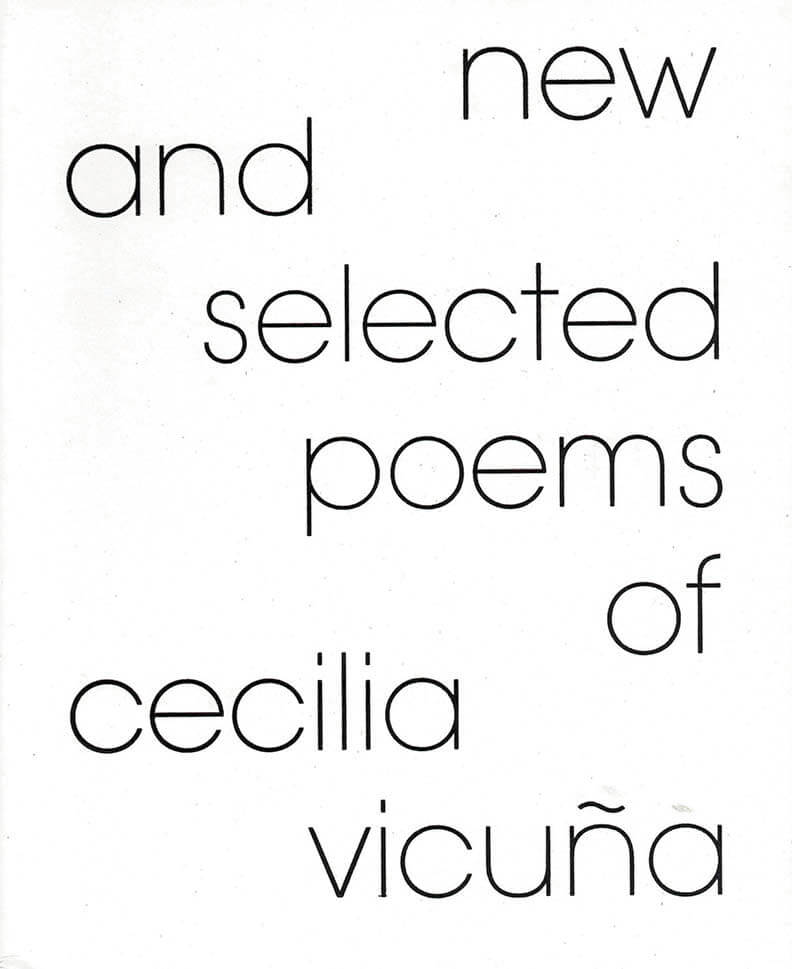
New and Selected Poems of Cecilia Vicuña
New and Selected Poems of Cecilia Vicuña is a telling of old cultures, modern nation states and lives in exile. Rodrigo Toscano calls Vicuña's poetry the outer out, beyond nation states, passed 'inter state' affairs, in other words, close in, as close as we get to our fair planet's sources, and to each other. In this bilingual collection, Vicuña and her translator, Rosa Alcalá, are artist witnesses to a natural world that is a storehouse of sacred words, seeds, threads and songs. Present everywhere, they are sources for a rebalancing in human relationships and for new forms of grace and healing. In Vicuña's vision, art is life and intimacy with it is transformative.
Cecilia Vicuña is a Chilean poet, artist and filmmaker. The author of twenty poetry books published in Europe, Latin America and the U.S., she performs and exhibits her work widely. A precursor of conceptual, impermanent art and the improvisatory oral performance, her work deals with the interactions between language, earth and textiles. Her recent books are NEW AND SELECTED POEMS OF CECILIA VICUÑA (Kelsey Street Press, 2018), SPIT TEMPLE: THE SELECTED PERFORMANCES OF CECILIA VICUÑA (Ugly Duckling Presse, 2012), Chanccani Quipu, a new artist book by Granary Books, and SABORAMI (ChainLinks, 2011). She co-edited The Oxford Book of Latin American Poetry (2009). Since 1980 she divides her time between Chile and New York.
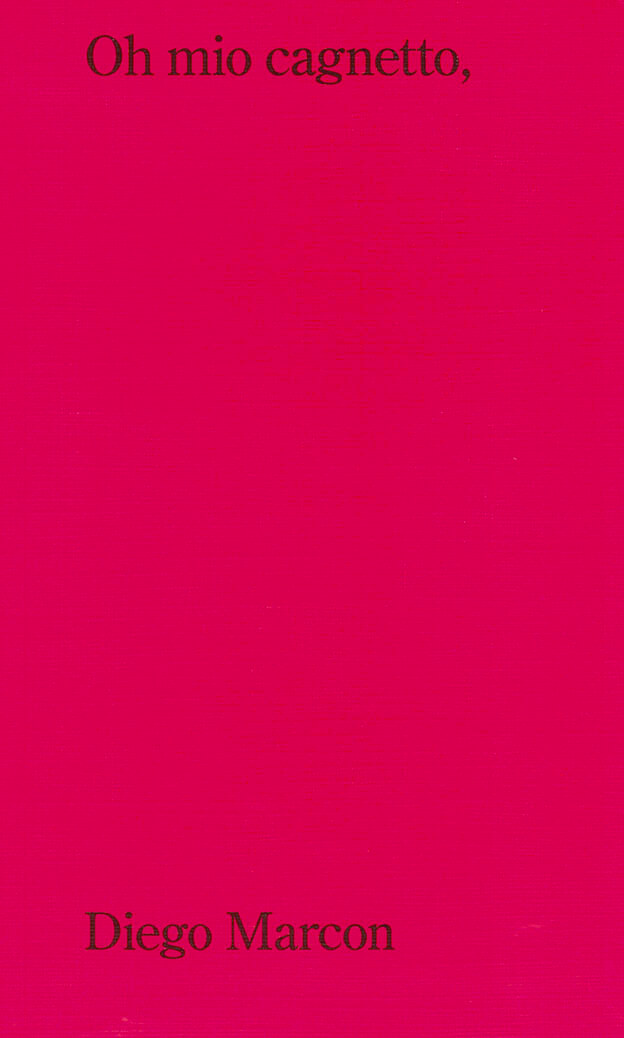
Oh mio cagnetto
Oh mio cagnetto is the artist's first book of writings, conceived as an artwork. It is a collection of 81 little poems that revolve around the missed and mourned figure of a puppy.
These short nursery rhymes all open with the same words and employ the same structure: two rhymed couplets in traditional meter. A seemingly naïve, childish voice speaks of violence, death and grief, yet never slips into pure plaintive lament. Balancing pathos with humor, the poems turn the puppy into a figure that evokes a broader sense of loss.
Oh mio cagnetto, was written between 2018 and 2020 and is now in the collection of MACRO in Rome. It intentionally plays on the ambiguity of its nature, as both a book distributed in conventional ways and an art object that belongs to a museum.
Diego Marcon (born 1985 in Busto Arsizio, Italy, lives and works in Paris) is a visual artist working mostly with film and video.

Blackspace: On the Poetics of an Afrofuture
Black artists of the avant-garde have always defined the future.
Blackspace: On the Poetics of an Afrofuture is the culmination of six years of multidisciplinary research by trans poet and curator Anaïs Duplan about the aesthetic strategies used by experimental artists of color since the 1960s to pursue liberatory possibility. Through a series of lyric essays, interviews with contemporary artists and writers of color, and ekphrastic poetry, Duplan deconstructs how creative people frame their relationships to the word, "liberation." With a focus on creatives who use digital media and language-as-technology, luminaries like Actress, Juliana Huxtable, Lawrence Andrews, Tony Cokes, Sondra Perry, and Nathaniel Mackey, Duplan offers three lenses for thinking about liberation: the personal, the social, and the existential. Arguing that true freedom is impossible without considering all three, the book culminates with a personal essay meditating on the author's own journey of gender transition while writing the book.
Anaïs Duplan is a trans* poet, curator, and artist. He is the founding curator for the Center for Afrofuturist Studies, an artist residency program for artists of color, based in Iowa City. He has worked as an adjunct poetry professor at the University of Iowa, Columbia University, Sarah Lawrence, and St. Joseph's College. He was a 2017-2019 joint Public Programs Fellow at the Museum of Modern Art and the Studio Museum in Harlem.
Published Oct 2020

Shame Space
Diaries of an avatar: a Bible-style artist's book of writings by Martine Syms
A new artist's book by California-based artist Martine Syms (born 1988), Shame Space explores the possibilities of narrative and identity, collecting journal writings by the artist from 2015 to 2017 in which she attempts to capture her shadow self, alongside image stills from the video project Ugly Plymouths. The text entries form the voiceover of Mythiccbeing (pronounced "my thick being'), a "black, upwardly mobile, violent, solipsistic, sociopathic, gender-neutral femme" digital avatar who has iterated across several of Syms' recent exhibitions. In Syms' installations, Mythiccbeing manifests variously in video, audio and as an interactive chatbot that responds to the viewer's communications with messages and animations.
In Shame Space, the character's autofictional, diaristic commentary is gathered into 15 chapters. Its design updates the Bible format with its A5 size, embossed leather-textured cover and silver edge painting. The Ugly Plymouths still-image selection was coded using a programming script, such that the design, like the chatbot's SMS responses, is an exercise in machine automation.
Published Dec 2020

Homie
Homie is Danez Smith’s magnificent anthem about the saving grace of friendship. Rooted in the loss of one of Smith’s close friends, this book comes out of the search for joy and intimacy within a nation where both can seem scarce and getting scarcer. In poems of rare power and generosity, Smith acknowledges that in a country overrun by violence, xenophobia, and disparity, and in a body defined by race, queerness, and diagnosis, it can be hard to survive, even harder to remember reasons for living. But then the phone lights up, or a shout comes up to the window, and family—blood and chosen—arrives with just the right food and some redemption.
Part friendship diary, part bright elegy, part war cry, Homie is the exuberant new book written for Danez and for Danez’s friends and for you and for yours.
& colin kaepernick is my president, who kneels on the air
bent toward a branch, throwing apples down to the children
& vets & rihanna is my president, walking out of global summitswith wine glass in hand, our taxes returned in goldto dust our faces into coins
& my mama is my president, her grace stuntson amazing, brown hands breaking brown bread overmouths of the hungry until there are none unfed & my grandma is my president
& her cabinet is her cabinetcause she knows to trust what the pan knowshow the skillet wins the war
—from “my president”

The Tiniest Muzzle Sings Songs of Freedom
Taking readers from suburban carports to wintry Russian novels, from summer tomato gardens to the sublime interiors of presleep thoughts, Magdalena Zurawski's poems anchor the complexities of our interconnected world in the singularity of the human experience. Balancing artistic experimentation with earnest expression, achingly real detail with dazzling prismatic abstraction, humor with frustration, light with dark, she offers a book of great human depth that is to be carried around, opened to anywhere, and encountered.
Magdalena Zurawski is the author of the novel The Bruise, which won the Ronald Sukenick Award from FC2 in 2008 and a LAMBDA literary award in 2009, and the collection of poems Companion Animal, which was published by Litmus Press in 2015 and won a Norma Faber First Book Award from the Poetry Society of America. She attended Brown University where she studied with poets Rosmarie and Keith Waldrop, C.D. Wright, and Peter Gizzi. She has lived in Berlin, New York, Philadelphia, San Francisco, and Durham, NC where she ran the Minor American Reading Series. She is currently Assistant Professor of English and Creative Writing at the University of Georgia.
Published April 2019

Sonnet(s)
A lost gem of permutational conceptualism from a key figure in artist's book culture, available again
Known internationally as one of Mexico's most important conceptual artists, Ulises Carrión (1941-89) played a decisive role in defining and conceptualizing the genre of the artists' book through his manifesto, The New Art of Making Books (1975), which he wrote soon after the 1972 publication of SONNET(S) and his move from Mexico City to Amsterdam, where he opened the legendary bookshop gallery, Other Books and So, the first space dedicated exclusively to artists' publications and an important precursor to such artists' book hubs as Printed Matter.
One of Carrión's earliest bookworks, SONNET(S) represents a landmark shift in the artist's output from poetry to artists' books. Here, Carrión takes a single poem by Dante Gabriel Rossetti through 50 typographic and procedural permutations. This republication is supplemented by new essays on Carrión's bookworks by contemporary artists, writers, and scholars from Mexico, Europe and the US.
Published March 2021

Andrei Monastyrski: Elementary Poetry
Russian poet, author, artist and art theorist Andrei Monastyrski (born 1949) is, along with Ilya Kabakov, one of the founders of conceptualism in Russia, and a protagonist of Collective Actions, a group of artists who have organized participatory actions on the outskirts of Moscow since 1976. Though his poetry is less well known, poetry is where he began. After writing in the manner of the Russian modernists (who were newly available to Soviet readers during Khrushchev's thaw), Monastyrski's interest in John Cage and ideas about consciousness from Western and Eastern philosophical traditions led him to conduct experiments with sound, form and the creation of artistic situations involving constructed objects that required viewer engagement to complete. Elementary Poetry collects poems, books and action objects from the '70s and '80s, tracing a genealogy of the art action in poetry.
Published Dec 2019

Bite Hard
The first collection by award-winning performance artist/poet Justin Chin. In Bite Hard, Chin explores his identity as an Asian, a gay man, an artist, and a lover. He rails against both his own life experiences and society's limitations and stereotypes with scathing humor, bare-bones honesty, and unblinking detail. Whether addressing "what really goes on in the kitchen of Chinese restaurants" or a series of ex-boyfriends, all named Michael, Chin displays his remarkable emotional range and voice as a poet. His raw, incantatory, stream-of-consciousness poems confront issues of race, desire, and loss with a compelling urgency that reflects his work as in performance, speaking directly to an audience. Throughout this collection, Chin demonstrates his uncanny ability to convey thought-provoking viewpoints on a variety of controversial subjects.
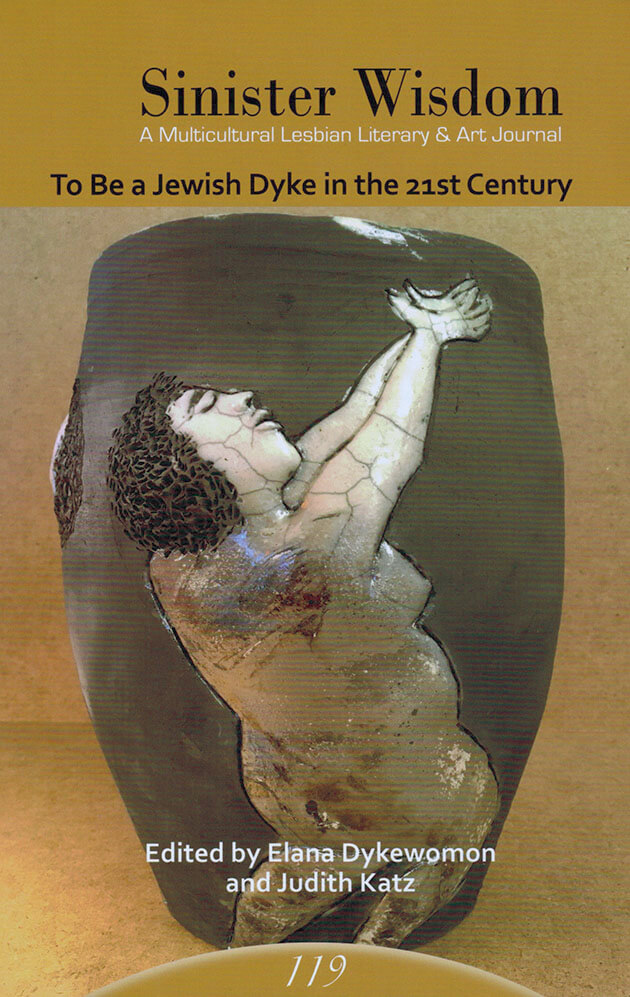
To Be a Jewish Dyke in the 21st Century
What are Jewish lesbians thinking about? Writing about? Making art about now, here in the first two decades of the 21st Century? Do we see ourselves as Jewish dykes? Jewish lesbians? Genderqueer Jews? How are we thinking about our Jewish lesbian communities and families, natal or invented? How have our relationships to the states of Israel and Palestine changed over time? Can we reconcile the contradictions between our faiths and our politics? Our gender and racial identities? How do we envision our futures and reimagine our pasts, especially in these fractious and dangerous times? One thing is certain. Our commitments to making trouble and speaking up are strong.
This issue of Sinister Wisdom: To Be a Jewish Dyke in the 21st Century, which takes its title from that life-giving stanza in Muriel Rukeyser’s epic poem “letter to the Front”, is a gathering of answers, challenges, and opinions directed at these and other questions.
Featuring work by
Yael Mishali
JEB (Joan E. Biren)
Terry Baum
Joan Larkin
Susan Sherman
Clare Kinberg
Irena Klepfisz
Nancy K Bereano
Penny Rosenwasser
Bonnie Morris
Jyl Lynn Felman
Marla Brettschneider
And more!
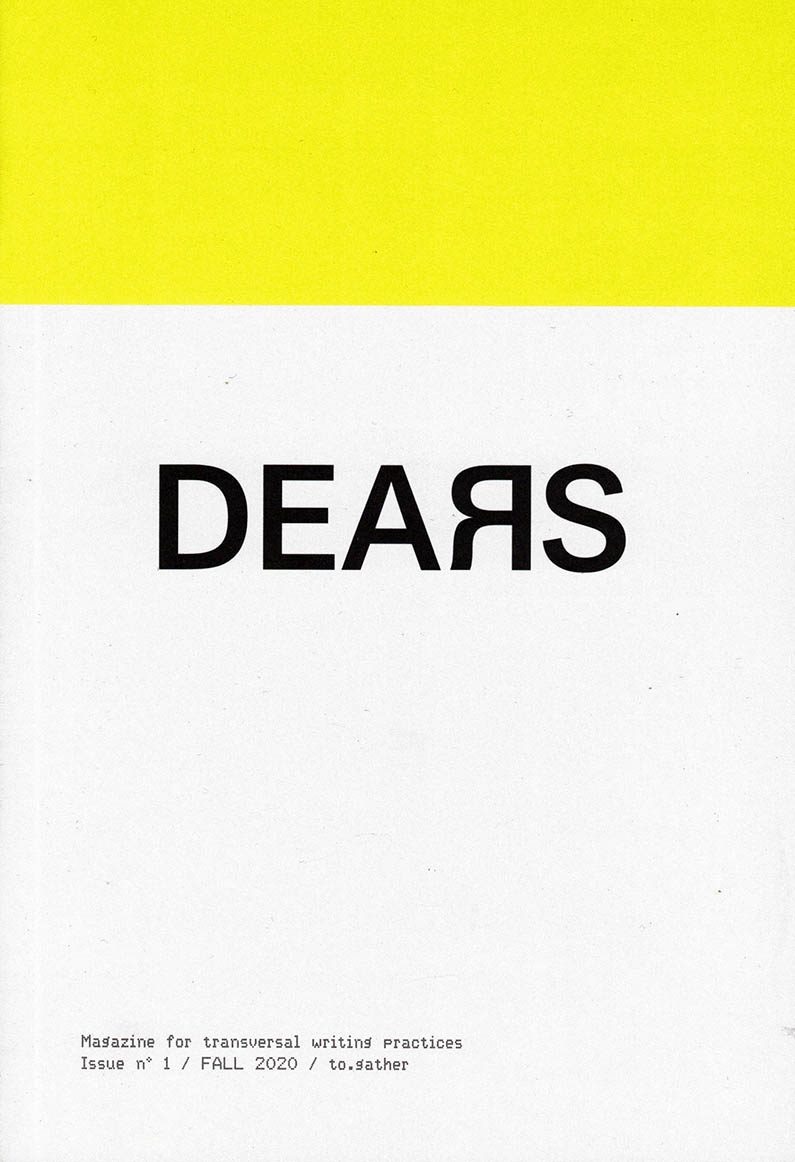
DEARS No. 1 TO.GATHER
Delphine Chapuis-Schmitz, Robert Steinberger and 1 more
DEARS Magazine on transversal writing, with texts by Season Butler, Crystal Z Campbell, Nicole Bachmann, Alessandro De Francesco, Benjamin Egger, Florinda Fusco, Gilles Furtwängler, Donna J. Haraway, Serafina Ndlovu, Rose Rand and Riikka Tauriainen.
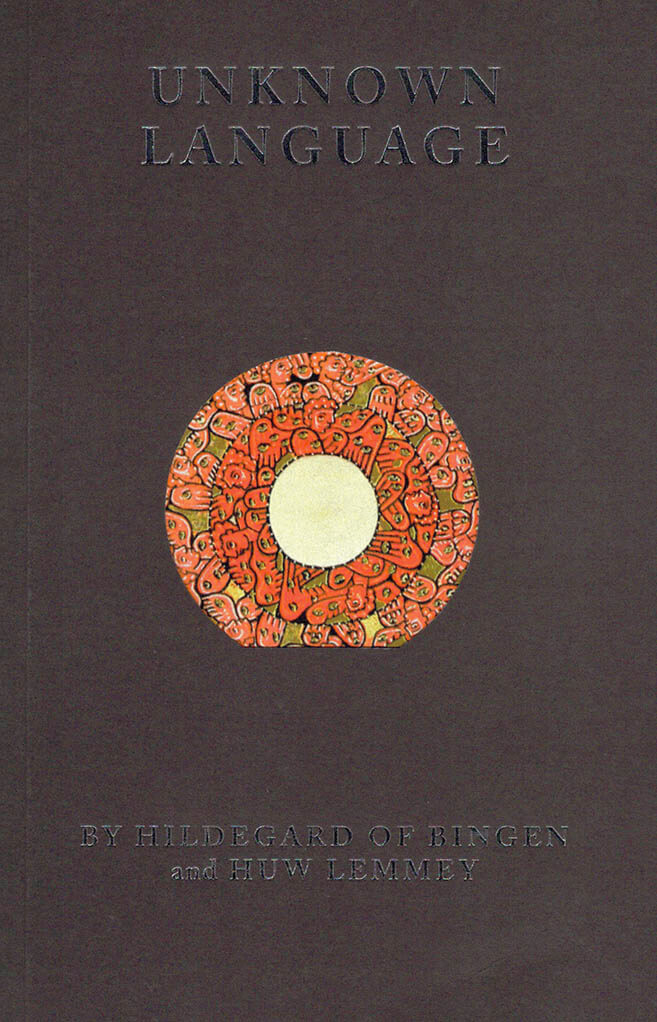
Unknown Language
Hildegard von Bingen, Huw Lemmey
Long, long before the Information Age ended, young Hildegard of Bingen finds beauty in the moral and spiritual ruins of her medieval world. In her forty-third year, she inscribes her cosmic visions into Scivias, an indescribably beautiful codex of writing and illuminations thought to be destroyed during the evacuation of Earth.
In a sea cave with cracked amethyst walls on Avaaz, Pinky Agarwalia discovers fragments of this visionary text containing hitherto unknown pathways to a lost vision of human co-existence with plants and non-humans - and the seeds of its rebirth on Avaaz.
Bursting with mythic quantum energy, Hildegard's vital linguistic potion viriditas, threaded throughout her communiqués, is a lush, verdant, renewable life-force. Her ecological message may be just the magic needed for rebirth on Avaaz. Hildegard's mystic toolkit for the future includes a cosmology, medicine, a morphology of crystals, recipes - and the symbols of a new language.
As Pinky Agarwalia traces the diagrams with her fingertip, she suddenly understands - a vision that appears without warning in her own mind - that she must first immerse these materials in water, a guarded substance. In the water, the molecules of the hidden language dissolve, freeze then reconfigure into new shapes, the crystalline language communicated not through sound but by feeling and light. Lingua Ignota, Hildegard's mysterious invented 'unknown language', arrives just in time for a world in flux, one whose coordinates are being recast.
Hildegard von Bingen (1098-1179), also known as Saint Hildegard and the Sibyl of the Rhine, was a German Benedictine abbess, writer, composer, philosopher, Christian mystic, visionary, and polymath. She is considered to be the founder of scientific natural history in Germany.
Huw Lemmey is a writer and publisher. He writes on culture, politics and sexuality, and is the author of the novels Chubz and Red Tory (Montez Press).

Glaring
Glaring: a sustained look of anger, an obvious fact, a situation of such brightness and intensity that vision is obscured. In his debut book of poems, Benjamin Krusling is concerned with reading domination and violence and entering their psychotic motion, the better to do otherwise. Through the thicket of anti-blackness, militarism, surveillance, impoverishment, and interpersonal abuse and violence, Glaring investigates the things that haunt daily life and make love difficult, possible, necessary.
Benjamin Krusling's Glaring is the winner of our 2019 Open Reading Period, and was selected by guest judge Lucy Ives.
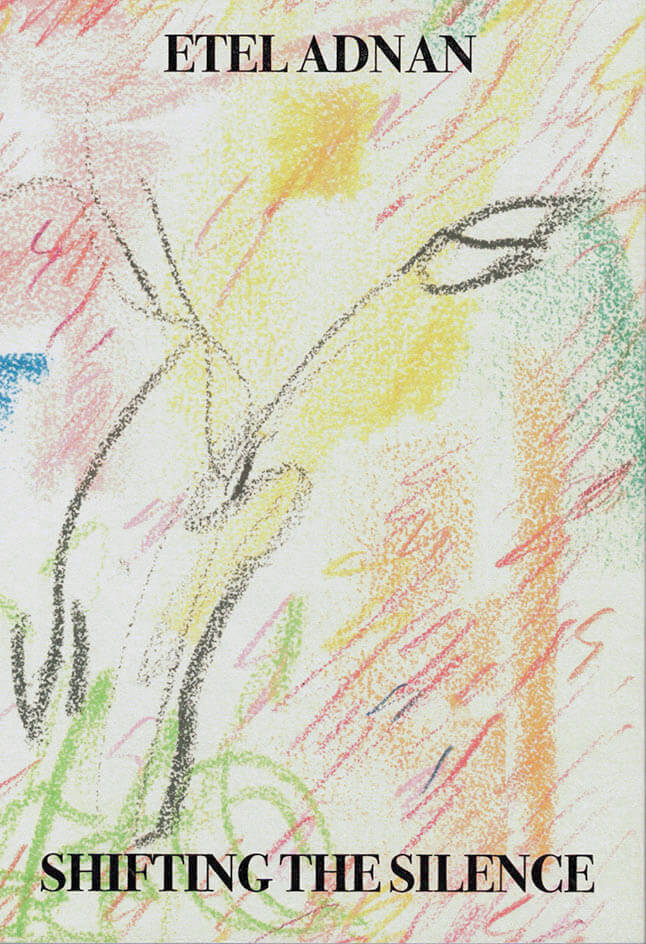
Shifting the Silence
A heart-rending meditation on aging, grief, and the universal experience of facing death.
Etel Adnan was born in Beirut, Lebanon in 1925. She studied philosophy at the Sorbonne, U.C. Berkeley, and at Harvard, and taught at Dominican College in San Rafael, California, from 1958-1972. In solidarity with the Algerian War of Independence (1954-1962), Adnan began to resist the political implications of writing in French and became a painter. Then, through her participation in the movement against the Vietnam War (1959-1975), she began to write poetry and became, in her words, "an American poet." In 1972, she returned to Beirut and worked as cultural editor for two daily newspapers—first for Al Safa, then for L'Orient le Jour. Her novel Sitt Marie-Rose, published in Paris in 1977, won the France-Pays Arabes award and has been translated into more than ten languages. In 1977, Adnan re-established herself in California, making Sausalito her home, with frequent stays in Paris. Adnan is the author of more than a dozen books in English, including Journey to Mount Tamalpais (1986), The Arab Apocalypse (1989), In the Heart of the Heart of Another Country (2005), and Sea and Fog (2012), winner of the Lambda Literary Award for Lesbian Poetry and the California Book Award for Poetry. In 2014, she was awarded one of France's highest cultural honors: l'Ordre de Chevalier des Arts et Lettres. Many of her poems have been put to music by Tania Leon, Henry Treadgill, Gavin Bryars, Zad Moultaka, Annea Lockwood, and Bun Ching Lam. Her paintings have been widely exhibited, including Documenta 13, the 2014 Whitney Biennial, CCA Wattis Institute for Contemporary Arts, The New Museum, and Museum der Moderne Salzburg. In 2014, Mathaf: Arab Museum of Modern Art mounted a retrospective of her work.
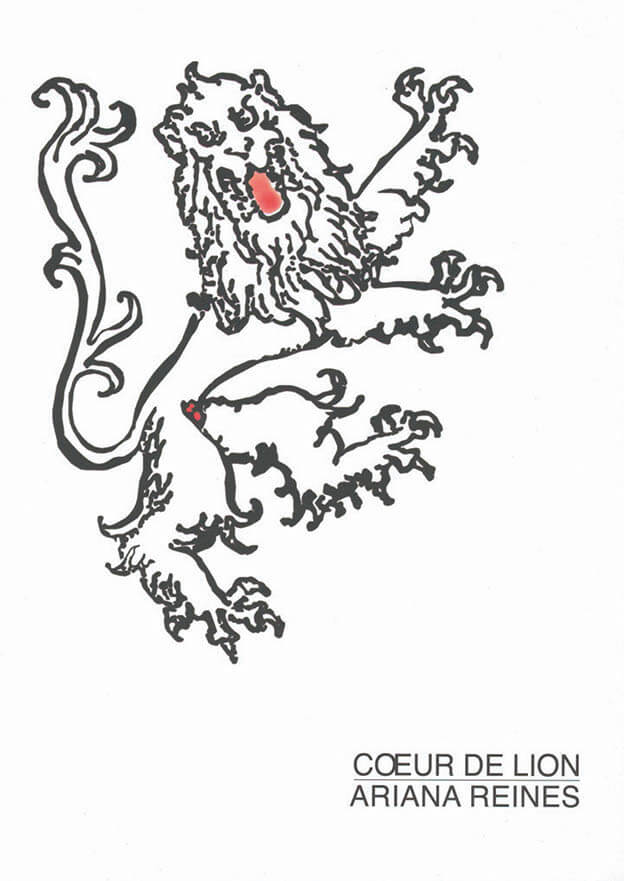
Coeur de Lion
A reissue of the instant cult-classic love poem, an investigation of poetic address.
Now that I am not addressing you
But the "you" of poetry
I am probably doing something horrible and destructive.
But this "I" is the I of poetry
And it should be able to do more than I can do.
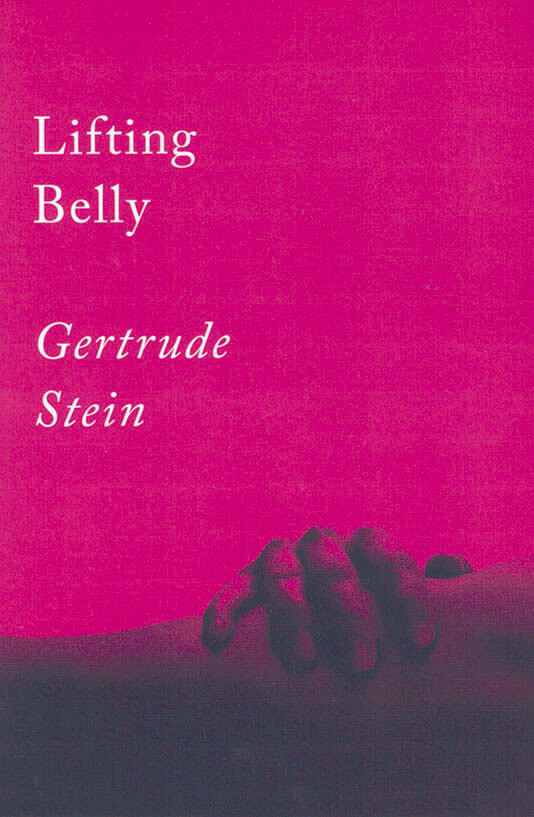
Lifting Belly: An Erotic Poem
Often considered the central erotic work of Stein's middle period, this love poem written to her longtime companion, Alice B. Toklas, reveals a vulnerability and tenderness unexpected of one so famous for caustic wit. Associative in structure, the work consists of alternately cryptic and conversational fragments detailing a shared domestic life. A very brief initial section observes the hardships of gay estrangement from society, while the body of the work applauds the decision to endure these for love's sake. Readers will welcome an unusual view of Stein in this work in which lifting belly, signifying sexual union, comes to imply passionate commitment to another and acceptance of oneself.
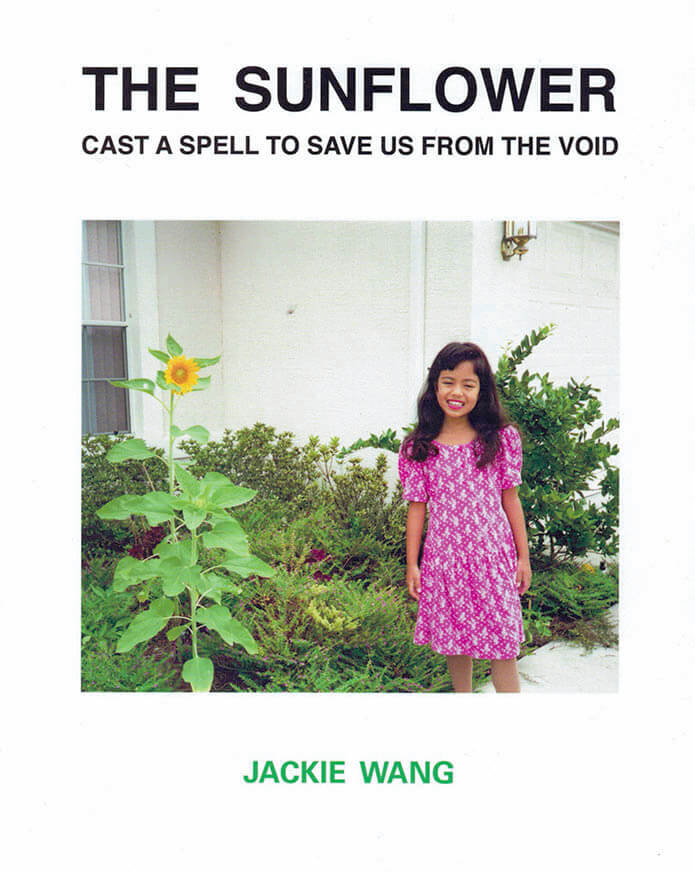
The Sunflower
Jackie Wang's magnetic and spellbinding debut collection of poetry that attempts to speak in the language of dreams.
The poems in The Sunflower Cast A Spell To Save Us From The Void read like dispatches from the dream world, with Jackie Wang acting as our trusted comrade reporting across time and space. By sharing her personal index of dreams with its scenes of solidarity and resilience, interpersonal conflict and outlaw jouissance, Wang embodies historical trauma and communal memory. Here, the all-too-familiar interplay between crisis and resistance becomes first distorted, then clarified and refreshed. With a light touch and invigorating sense of humor, Wang illustrates the social dimension of dreams and their ability to inform and reshape the dreamer's waking world with renewed energy and insight.
Jackie Wang is a student of the dream state, black studies scholar, prison abolitionist, poet, performer, library rat, trauma monster and PhD candidate in the Department of African and African American Studies at Harvard University, specializing in race and the political economy of prisons and police in the United States. She is the author of a number of punk zines including On Being Hard Femme, as well as a collection of dream poems titled Tiny Spelunker of the Oneiro-Womb. In 2018 she published a book, titled Carceral Capitalism on the racial, economic, political, legal, and technological dimensions of the US carceral state. She is currently an Arleen Carlson and Edna Nelson Graduate Fellow at the Radcliffe Institute for Advanced Study.
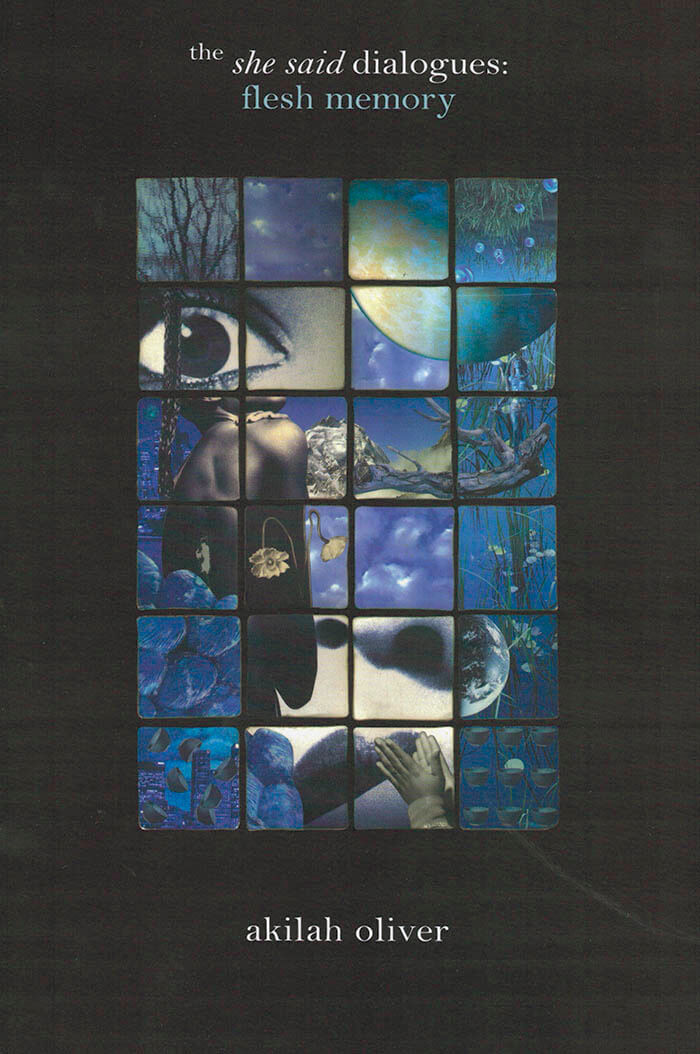
the she said dialogues
A reprint of the intersectional black feminist classic by the late poet and performer Akilah Oliver.
In her original author's note to the 1999 edition, Akilah Oliver writes,"What I am trying to do in these poems is investigate the non-linear synapses between desire, memory, blackness (as both a personal identity and a non-essentialist historical notion), sexuality and language." the she said dialogues: flesh memory proves to be not only still timely twenty years later, but essential reading for understanding intersectional politics and poetics in our current moment.
Akilah Oliver was born in St. Louis and grew up in Los Angeles. She was the author of two books of poetry: A Toast in the House of Friends (2009) and the she said dialogues: flesh memory (1999), which received a PEN Beyond Margins award. Her chapbooks include A Collection of Objects (2010), a(A)ugust (2007), The Putterer's Notebook (2006), and An Arriving Guard of Angels, Thusly Coming to Greet (2004). Oliver collaborated with a range of artists and musicians, such Tyler Burba, Anne Waldman, and Rasul Siddik; a notable performer, Oliver founded the feminist performance collective Sacred Naked Nature Girls in the 1990s. She was a member of the Belladonna* collaborative and a PhD candidate at the European Graduate School.

I Remember
Joe Brainard's I Remember is a literary and artistic cult classic, praised and admired by writers from Paul Auster to John Ashery and Edmund White. As autobiography, Brainard's method was brilliantly simple: to set down specific memories as they rose to the surface of his consciousness, each prefaced by the refrain "I remember": "I remember when I thought that if you did anything bad, policemen would put you in jail."
Brainard's enduring gem of a book has been issued in various forms over the past thirty years. In 1970, Angel Hair books published the first edition of I Remember, which quickly sold out; he wrote two subsequent volumes for Angel Hair, More I Remember (1972) and More I Remember More (1973), both of which proved as popular as the original. In 1973, the Museum of Modern Art in New York published Brainard's I Remember Christmas, a new text for which he also contributed a cover design and four drawings. Excerpts from the Angel Hair editions appeared in Interview, Gay Sunshine, The World and the New York Herald. Then in 1975, Full Court Press issued a revised version collecting all three of the Angel Hair volumes and added new material, using the original title I Remember. This complete edition is prefaced by poet and translator Ron Padgett.
Published 2001
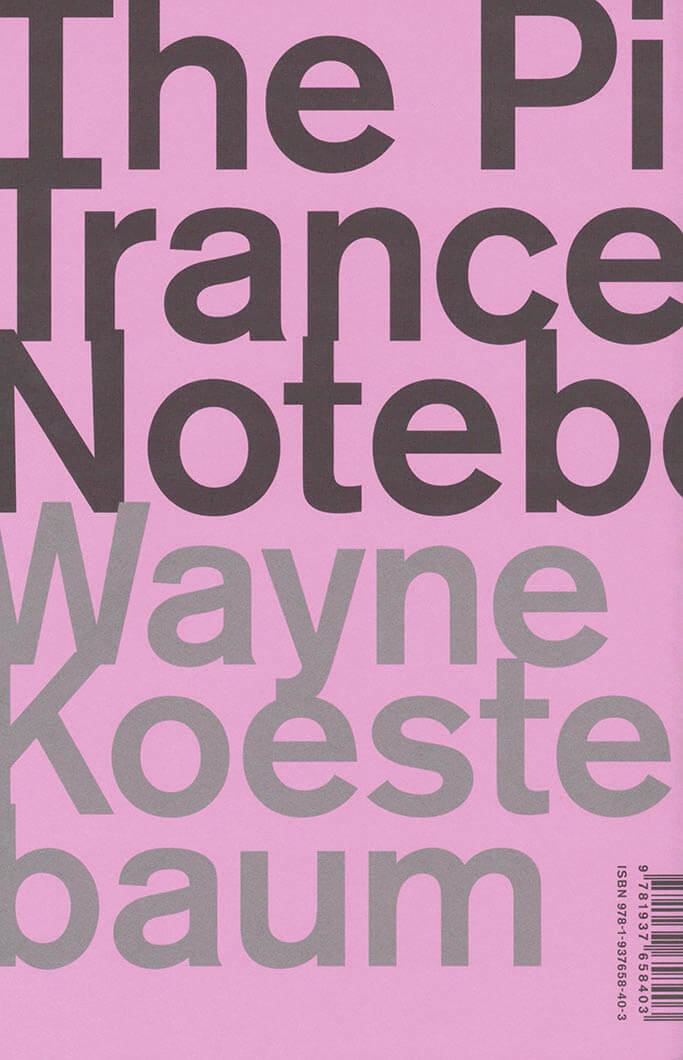
The Pink Trance Notebooks
The Pink Trance Notebooks is the product of the year Wayne Koestenbaum stopped keeping the traditional journal he had maintained for three decades and began a series of "trance notebooks" as a way to reflect an intensified, unmoored consciousness. The resulting sequence of 34 assemblages reflects Koestenbaum's unfettered musings, findings, and obsessions. Freed from the conventions of prose, this concatenation of the author's intimate observations and desires lets loose a poetics of ecstatic praxis—voiced with aplomb and always on point.
"Wayne Koestenbaum is one of the most original and relentlessly obsessed cultural spies writing today. His alarmingly focused attention to detail goes beyond lunacy into hilarious and brilliant clarity." —John Waters
WAYNE KOESTENBAUM is a poet and cultural critic. His recent books include My 1980s & Other Essays, Humiliation, The Anatomy of Harpo Marx, and the poetry collection Blue Stranger with Mosaic Background. He lives in New York City.
Published 2015.

The Cow
This text is filthy and fertilized, filling and emptying, filling and emptying, atrocious and politic with meaning. The Cow is a mother, a lover, and a murdered lump of meat, rendered in the strongest of languages. I cannot count the altering that happens in the very large rooms that are the guts of her.
To call Ariana Reines’ poetry scatological doesn’t even scratch the surface. “I COULD BE A DIAPER FOR THE DAY’S RESIDUALS,” she writes, and, “She clasped the event to her and proceeded. Fucked her steaming/ eyehole and ended it.” The Cow is a body in the way that texts are bodied—”Are you so intelligent your body doesn’t have you in it.”—but not in the way that allows the text to become desensitized, depersonalized, sterilized.
Winner of the 2006 Alberta Prize